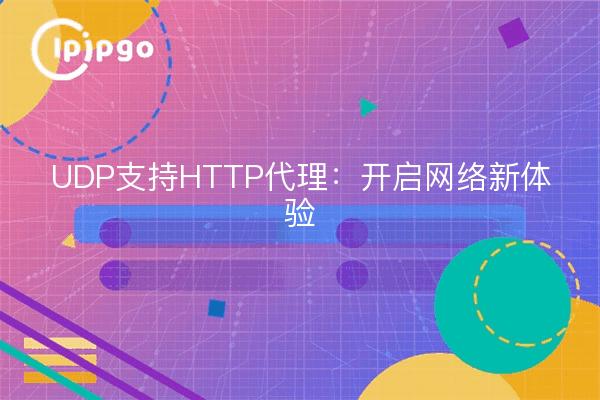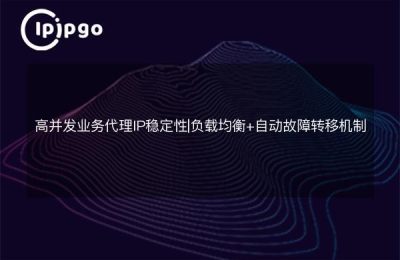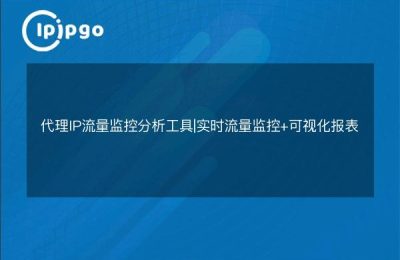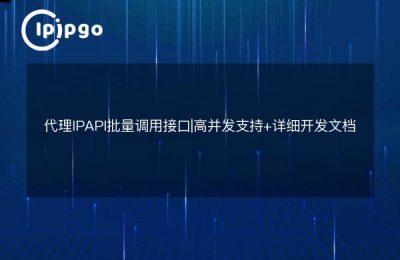
Proxy IP technology has become an essential tool for many users in the modern network environment, whether for privacy protection or to improve the network experience, proxy IP plays an important role. Today, we are going to explore a more professional and interesting topic - UDP support for HTTP proxies. So, let's unveil the mystery!
What are UDP and HTTP proxies?
First of all, we need to understand some basic concepts.UDP, full name is User Datagram Protocol (User Datagram Protocol), is a connectionless transport layer protocol. It is characterized by fast speed, but does not guarantee the reliability of the data, and is suitable for applications with high real-time requirements, such as live video broadcasting, online games, and so on.
HTTP proxy is a kind of application layer proxy, which forwards the client's request through the HTTP protocol to achieve the purpose of hiding the real IP address, breaking through the geographic limitations, etc. HTTP proxy can cache the web page content to improve the speed of access, but also can filter the ads and malicious content.
How does UDP support HTTP proxies?
At first glance, UDP and HTTP proxies seem to be two concepts that are not related to each other, but in fact, they can be achieved through some technical means to achieve the perfect combination. Specifically, UDP support for HTTP proxy implementation of the following ways:
1. UDP to HTTP: Through an intermediate server, UDP packets are converted into HTTP requests, which are then processed by an HTTP proxy server. The advantage of this approach is good compatibility, but may add some latency.
2. HTTP over UDP: Encapsulate the HTTP request directly in the UDP packet, which can ensure the HTTP proxy function while utilizing the efficient transmission characteristics of UDP. This approach is technically difficult, but the effect is very significant in specific scenarios.
Advantages of UDP support for HTTP proxies
So what exactly are the advantages of UDP support for HTTP proxies? Let's take a look:
1. Efficient transmission: The connectionless nature of UDP makes it fast and suitable for application scenarios with high real-time requirements. Combined with HTTP proxy, it can improve network transmission efficiency while ensuring privacy and security.
2. Highly flexible: Supporting HTTP proxy via UDP, users can freely switch between different network environments without the restriction of traditional HTTP proxy servers and enjoy a more flexible network experience.
3. Reduced latency: In some cases, UDP support for HTTP proxies can significantly reduce network latency, especially for applications that need to send small packets frequently, such as online games and instant messaging.
Practical application scenarios
Next, let's look at scenarios where UDP support for HTTP proxies is used in practice.
1. online game: Network latency is a huge headache for online gamers. By using UDP to support HTTP proxies, you can effectively reduce latency and improve your gaming experience.
2. live video broadcast: Live video streaming has very high real-time requirements, using UDP to support HTTP proxies can ensure smooth live streaming and reduce lag and latency.
3. telecommuting: In remote office scenarios, UDP support for HTTP proxies can provide a more efficient network connection, ensuring that videoconferencing and file transfers proceed smoothly.
How to choose the right proxy IP service
After understanding the advantages and application scenarios of UDP-enabled HTTP proxies, the next step is how to choose the right proxy IP service. Here are some suggestions:
1. Service Stability: Choose a stable and reliable proxy IP service provider to ensure continuity and stability of service.
2. Speed and latency: The speed and latency of proxy IP services are key factors affecting user experience, and it is recommended to choose those service providers with good reputation and user reviews.
3. Privacy: Privacy protection is one of the main purposes of using proxy IP services, and it is especially important to choose service providers that have strict privacy policies and safeguards in place.
concluding remarks
Overall, UDP Support HTTP Proxy is a very promising technology, which can not only improve the efficiency of network transmission, but also provide a more flexible and efficient network experience. Whether it's online gaming, live video streaming or remote office work, UDP-enabled HTTP proxy can bring you unexpected convenience and surprise. If you haven't tried this technology yet, why don't you start experiencing it now?








